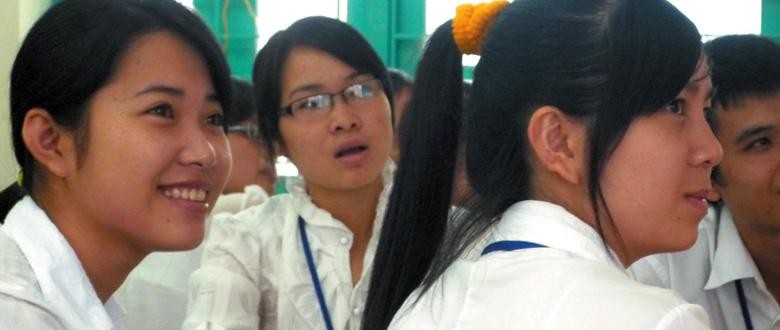
In 2009, the impact of the global financial crisis was felt all over the world. Although the direct effects on Vietnam were rather insignificant, the country was affected by the relaps of foreign investment, decreased remittance inflow and labour emigration, less export and lower export prices. The educational sector experienced a slight decrease of public and private funding. In the agricultural sector, prices for cash crops declined, with less income as a result, but in general not causing unemployment.
The H1N1 pandemic affected some 10 000 cases in Vietnam, of which more than 50 were fatal. The spread of the virus is still increasing and the World Health Organisation expects more people with serious complications of which some will die.
In October and November several storms hit the coast of Central and South Vietnam. After Ketsana, in the beginning of October, and Parma later that month, a third typhoon, Mirinae, struck in the beginning of November. Together they caused over 300 fatalities and Ketsana alone was estimated to have caused about € 620 million in damages, Mirinae another € 250 million, destroying the livelihood of tens of thousands of farmers and fishermen and leaving thousands of people homeless.
VVOB is involved in the educational and agricultural sector in Vietnam. These are extremely important in poverty reduction, and the Vietnamese government is very much aware of this. These sectors receive a lot of attention in policy documents (e.g. the Strategic Economic Development Plan (2005-2010, 2010-2015), the National Programme for a New Rural Development Model (2010-2020) and the Education Development Strategic Plan (2011-2020).
Improvement of the quality of Lower Secondary Education
In education, VVOB focuses on the improvement of the quality of Lower Secondary Education (LSE) in five provinces in North and Central Vietnam. We support innovative teaching methodologies (Active Teaching and Learning) and use Environmental Education (EE) and Information and Communication Technologies (ICT) as entry points.
The main strategy of our education programme 2008-2010 is capacity development. For this, the teacher training is a target of our intervention. We train teacher trainers in the pre-service and in-service. However, teachers are unlikely to change their teaching as a consequence of training only; they also need to feel the support and encouragement of the educational managers and the community. That is why we focus on educational managers and Mass Organisations. The latter are considered important actors in education by the Vietnamese government and their involvement is part of the envisioned socialisation of education.
The Vietnamese educational system is, as in many Asian countries, focused on knowledge transfer and is teacher-centred. The government wants to change this and stresses innovative teaching methodologies, student-centred teaching and skill transfer. Innovative teaching methodologies and a more learner-centred approach are also part of the movement 2008-2013 on Child Friendly Schools, Active Students. This movement receives a boost in 2009 when the Ministry of Education and Training and the Women’s Union and Youth Union agree to join efforts. Our strains to build capacity in the Women’s Union to support the link between community and school fits very well into this joint effort.
Top-down and bottom-up
The agricultural extension system follows a typical top-down approach. VVOB supports the use of participatory approaches to come to a more effective agricultural extension system, based on farmers’ needs. The programme runs in five provinces in South Vietnam. Part of the effort is to enhance the capacity of agricultural extension workers and Farmers’ Clubs. These clubs can be an entry point for the agricultural extension services to collect and disseminate information. An evaluation this year, of six older clubs, indicates that farmers are indeed becoming more empowered to voice their problems in club meetings. Another achievement relates to the experiments farmers have identified and set-up themselves and through which farmers and extension workers jointly learn about ways to improve farming practices. The uptake of participatory methods by extension workers varies, but in some provinces, the shift towards a more farmers’ needs-based approach is already very clear.
A new decree is in the making that is more oriented on farmers than on producers. This increases the importance of farmers in production and extension. In addition, the decree encourages pro-activeness of farmers and capacity development for extension workers, which are also the current objectives of the VVOB programme.




